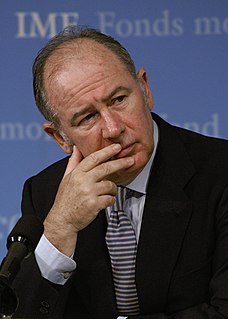A Quote by John H. Makin
The fact that global savers accommodate U.S. consumers by keeping U.S. interest rates lower than they otherwise would be and the dollar stronger than it otherwise would be is simply a manifestation of America's comparative advantage at supplying wealth storage facilities.
Related Quotes
A strong currency means that American consumers and businesses can buy imported goods and services more cheaply and that inflation and interest rates will be lower, ... It also puts pressure on American industry to increase productivity and competitiveness. These benefits can feed on themselves as foreign capital flows in more readily because of greater confidence in our currency. A weak dollar would have the contrary effects.
Abraham Lincoln did speak about keeping the man before the dollar, but he was talking at that moment about slavery, and referring to keeping the humanity of the slave higher in view than the self-interest of the slaveholders. This does not quite make Lincoln a challenger of the corporations; in fact, he prefaced those words by saying that Republicans were for the man AND the dollar.
Price fixing does not represent simply windfall gains and losses to particular groups according to whether the price happens to be set higher or lower than it would be otherwise. It represents a net lose to the economy as a whole to the extent that many transactions do not take place at all, because the mutually acceptable possibilities have been reduced.
To the distracting occupations belong especially my lecture courses which I am holding this winter for the first time, and which now cost much more of my time than I like. Meanwhile I hope that the second time this expenditure of time will be much less, otherwise I would never be able to reconcile myself to it, even practical (astronomical) work must give far more satisfaction than if one brings up to B a couple more mediocre heads which otherwise would have stopped at A.

































